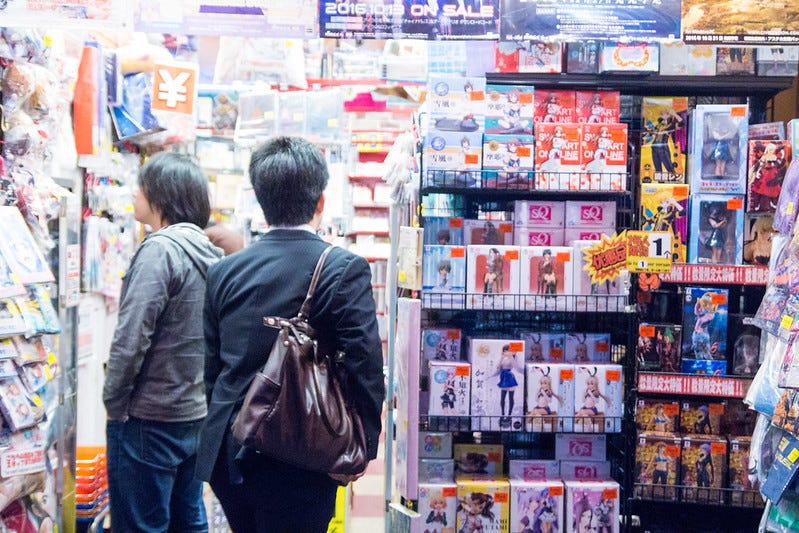Tariff threats loom over U.S. anime merch imports
Plus: Blackstone closes webtoon platform acquired in Mecha Comic purchase; 'Oshi no Ko' anime sales surge; Changing attendance behavior at anime events; and more
This is your weekly Animenomics briefing, covering the business of anime and manga. Today is Wednesday, February 12, 2025.
In case you missed it: Yasuhisa Hara’s historical fiction manga Kingdom, a winner of the Tezuka Osamu Cultural Prize, will be released in the English language for the first time at the end of the year.
Five anime series and four live-action films based on the manga have been made to this date, with the latest film earning more than ¥8 billion (US$52 million) in the Japanese box office last year, placing third in the annual box office rankings.
End of duty exemptions hits anime merch made in China

Cross-border online purchases of anime merchandise from Japan are growing rapidly, but new tariffs and an end to duty exemptions on low-value imports of Chinese-made goods to the United States could disrupt this trend for American consumers.
Why it matters: Import duties and tariffs target products based on the country where they are made, not sold, and Japan often outsources manufacturing of toys and anime merchandise to China.
Catch up quick: U.S. president Donald Trump last week suspended, then reinstated a trade provision that allowed parcels of Chinese-made products under US$800 in value to be shipped to the country without paying import taxes.
The rule, known as the de minimis exemption, has facilitated a rapid rise in cross-border e-commerce purchases by U.S. consumers since its value threshold was raised from US$200 in 2016.
Trump is likely to suspend de minimis exemptions again in the near future, after which U.S. consumers who are accustomed to cheap Chinese-made goods will then be required to pay both import duty and tariff.
What’s at stake: Industrial supply data compiled in 2015 by the Ministry of Economy, Trade, and Industry found that 95 percent of toys sold in Japan were made overseas.
Japan’s toy imports from China last year were valued at more than ¥334 billion (US$2.2 billion), about 80 percent of the country’s total toy imports, according to an Animenomics analysis of trade data published by the Ministry of Finance.
While toys are not yet subject to import duties, escalating trade conflict between the U.S. and China could eventually result in U.S. consumers being asked to pay duties and tariffs on these products.
What’s happening: U.S. customers who bought merchandise from the online shop of Tokyo-based virtual YouTuber agency Hololive Production last week began receiving import duty payment requests from shipping carrier DHL for products made in China.
Hololive Production later confirmed that its international shipping partner was complying with U.S. import duty requirements.
Online anime retailers like Animate International and AmiAmi have long said that customers are responsible for paying any duties charged by customs authorities.
The bigger picture: As previously reported by Animenomics, anime’s global surge in popularity since the COVID-19 pandemic has driven up demand for character figures and other anime merchandise at Japanese proxy buying services.
Tokyo Stock Exchange-listed Beenos said last month that its Buyee proxy buying service saw gross merchandise value for the fiscal year ending in September 2024 climb 31 percent to ¥77.5 billion (US$510 million).
Anime and manga merchandise was the fastest-growing product category among Beenos customers in North America, Europe, East Asia, and Southeast Asia.
What we’re watching: Vietnam’s share of Japanese toy imports has grown in recent years, making the country a possible alternative for anime merchandise manufacturing should duties and tariffs on Chinese-made products continue to rise.
“Many anime title licensees have begun the manufacture of their products in Vietnam in recent years as there is a free trade agreement with the U.S. that doesn’t result in tariffs for products made there,” John Parker, principal at Patencio Development, a brand licensing consultancy, told Animenomics.
Go deeper: Expert panel explains the de minimis exemption in U.S. trade policy
Webtoon platform Peanutoon abruptly ends operations

South Korean webtoon platform Peanutoon announced last month that it would end operations at the end of February, prompting concerns from webtoon creators and readers about the impacts of its abrupt closure.
Why it matters: Peanutoon, which is only available in South Korea, is operated by Tokyo-based Amutus, whose parent Infocom was acquired by global private equity fund Blackstone last year.
Catch up quick: Peanutoon reported growing revenues in the first four years after it was acquired by Amutus in 2019, but sales suddenly fell in the fiscal year that ended March 2024.
Amutus attributed the revenue miss to growing competition from other webtoon platforms in South Korean and Peanutoon’s inability to produce a hit title.
K-Comics Beat reports that Blackstone may have moved to close Peanutoon in a quest to quickly realize profits from its acquisition of Infocom.
Where things stand: The Korea Cartoonist Association and the Korea Webtoon Writers Association have called on Peanutoon to compensate creators for damages from the sudden announcement and to return all submitted manuscripts.
Zoom out: Despite Peanutoon’s closure, Blackstone still has overseas expansion plans for Mecha Comic, the Amutus-owned digital manga platform popular with Japanese women ages 30 and above that was the primary reason for acquiring Infocom.
“Manga is one of Japan’s industries that maintains global competitiveness, so we would like to actively work on overseas expansion,” Blackstone Group Japan principal Yuya Yamaguchi told M&A Research Report Online in November.
Clippings: ‘Oshi no Ko’ anime sales soar at Kadokawa

Oshi no Ko’s anime adaptation has generated more than ¥9 billion (US$58 million) in net sales for Kadokawa since April 2023. The company’s earnings results for the April-to-December period recorded ¥5.4 billion (US$35 million) in net sales for the anime, on top of the ¥3.6 billion (US$23 million) earned the previous fiscal year. (Gamebiz)
Video sharing service Niconico, popular among Japanese anime fans, deleted more than 50,000 videos from the platform last month. Kadokawa-owned operator Dwango confirmed that it removed materials that were deemed to have violated content laws and regulations. (ITmedia News)
Backgrounder: As previously reported by Animenomics, Visa and other payment card networks have pressured payment processors to stop accepting their cards on platforms like Niconico that contain adult content like pornographic manga and anime.
Digital advertising company CyberAgent is relaunching San Francisco-based unit CyberAgent America as a subsidiary specializing in the global marketing of anime content. (Press release)
Private broadcaster Nippon Television will establish a business hub in Los Angeles in July to drive the North American expansion of Nippon TV content primarily focused on unscripted shows. (Press release)
North Carolina-based AnimEigo, one of the oldest remaining anime distributors in the U.S., will release a documentary series of interviews with business figures from the country’s early anime industry. (Anime News Network)
China’s Ne Zha 2, a sequel of the 2019 animated film, became the first movie ever to cross US$1 billion in box office earnings in a single market. (Deadline)
Pandemic reshapes anime live entertainment behaviors
Japan’s anime-related live entertainment market rose to a record ¥108 billion (US$704 million) in 2023, the year the government ended all restrictions on events and foreign arrivals related to the COVID-19 pandemic.
Why it matters: Market data compiled by the Association of Japanese Animations in its annual anime industry report show that the three years of pandemic restrictions have reshaped anime’s live entertainment market.
Zoom in: Anisong concerts and 2.5D musicals, anime’s two largest live entertainment segements, both saw record attendance levels and revenues.
Cumulative attendance at anisong concerts rose 7 percent to nearly 4.5 million people, and concert organizers have also begun holding shows abroad.
As previously reported by Animenomics, attendance at 2.5D musicals climbed to 5 percent to nearly 2.9 million, exceeding the pre-pandemic peak set in 2018.
The other side: Even as anime fans return to in-person events, they have also become accustomed to live-streamed events since the pandemic.
The market size for live broadcasts of concerts in cinemas is now half its size the year before the pandemic, thanks to a growing market for live-streamed concerts.
Anime-themed café businesses have also stagnated as sales remain more than 5 percent below pre-pandemic levels.
One big thing: Anime museums and theme parks saw the largest revenue growth among all live entertainment segments.
A major driver of this market segment is Ghibli Park, which opened at the end of 2022 in Aichi Prefecture and is popular with domestic and foreign tourists alike.
Animenomics is an independently-run and reader-supported publication. If you enjoyed this newsletter, consider sharing it with others.





Hola Richardson! Thanks for this week's edition. It is brilliant. May I ask you a question about the removal of duty free imports from China for USA based consumers?
According to a user named @revdrone on Reddit, the removal of duty free trade for goods parcels valued at $800 or less will impact consumers the following way.
"...For packages coming in, regardless of the package value, you will now need to pay import duties, appropriate tariffs based on the product and country of origin, and then you will also have to pay the brokerage fee which goes to a company that handles the duty and customs process which is determined by the shipping company which I have heard is around 50$ per package.
Regardless of the country of import, I believe that we are looking at a substantial cost to bring stuff from overseas. I suspect a order around 100$ will cost more like 200$.
Additionally US customs will now need to process MILLIONS of more packages over night. The system is going to completely jam up and unless the administration reverses course, I wouldn’t be surprised if it takes 3+ months to get through customs."
It sounds grim and a lot like all the bullshit we now go through here in the UK thanks to end of frictionless trade with EU based exporters. Has this Redditer more or less got this right?
Great article, and very informative. Thanks Richardson!
In Cover's case in particular, they are expanding in the US itself, so I guess they will eventually ship to a warehouse there and offer from a localised store... but this will definitely affect others (FuRyu -although also expanding in the US-, Kotobukiya...).
I wonder how this affects second hand products, as they are fairly common in proxy sales. Do you happen to know?